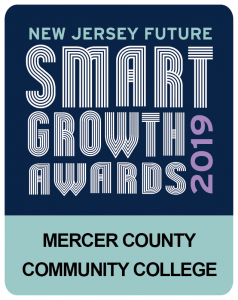A Pioneer Anchor for Neighborhood Revitalization
 Project Name: Mercer County Community College, Trenton
Project Name: Mercer County Community College, Trenton
Reactivation of a group of long-dormant buildings in an overlooked part of the city, with amenities to serve both students and residents
Partners: Clarke Caton Hintz; Mercer County Community College; City of Trenton; Mercer County
When Mercer County Community College was founded in 1966, its campus was in downtown Trenton, near the State House. Its West Windsor campus, constructed in 1972, took most of the college’s departments and activities to the suburbs. Left behind was a higher-education void in the city; only a small outpost of the college remained on North Broad Street, an economically depressed area that had been the epicenter for the riots in 1968. That building, Kerney Hall, was most memorable for its fortress-like exterior, with no windows or nearby street activity.
More than 40 years later, with cities just beginning their resurgence, the college began looking for ways to expand its programs and outreach around its old location. It amplified its focus on low-income students, many of whom are the first in their families to attend college. Its 2010 master plan and the plan’s 2017 plan update both had an ambitious agenda for re-establishing a presence in downtown Trenton to serve these students. Not only would Kerney Hall be refurbished but, through partnerships with the city, Mercer County and private developers, four additional buildings on North Broad Street, several of which had long been vacant, would be redeveloped and devoted to academic, arts, performance and retail spaces. A fifth, leased building would offer health- and science-related programs.
A key goal of the revitalization was to increase the interaction between the buildings and the street and to showcase student work to passers-by. Kerney Hall will get new windows to reduce its fortress-like feel. The large, storefront-style windows in Trenton Hall and Trenton Hall Annex act as flexible gallery space displaying work produced in the college’s fashion design and art programs.
A courtyard in the back of Trenton Hall Annex serves not just as a warm-weather lounge area but as a living classroom for landscape and horticulture students. Its green stormwater management features, including a bioretention basin and the diversion of roof-level stormwater away from the street to courtyard, allow stormwater to be harvested for irrigating the landscaping in the courtyard, reducing stormwater flow to city’s storm drain system. Addition of these features has kept most stormwater that runs off the building, except from the heaviest storms, out of the system.
The college is also a key part of a proposed arts, entertainment and education district that will align its North Broad Street campus with the city’s existing South Broad Street vision plan. As part of the arts district, a partnership with the public library around the corner will allow it to serve as the college’s library; the college bookstore and cafe will relocate to one of the storefronts; and a nearby vacant movie theater will be revitalized with performance and teaching spaces.
The North Broad Street area will also see street improvements, including bike lanes and street trees, to create a more college-oriented, pedestrian-friendly zone. The college, which is well served by bus transit, is pursuing sponsorship of a bike-share program to help connect the campus with the Trenton Transit Center and downtown cultural amenities and reduce the need for students to drive to school.
When this project was first proposed, it was seen as a pioneer investment when there was still substantial doubt about the viability of New Jersey’s cities. The city and the county were receptive, but the college had been so closely associated with a suburban location for so long that some of the biggest initial doubters were among its administration and Board of Trustees. Now they are enthusiastic supporters. The project has already increased street activity, bringing new students, faculty and staff to the area. It has reactivated long-vacant buildings, and created new linkages to the city’s civic and commercial center. The college hopes the continued expansion of its downtown presence will spark other development, including new housing opportunities so students, faculty and staff can live nearby.
Supporting Partners: Greater Trenton; Trenton Downtown Association











